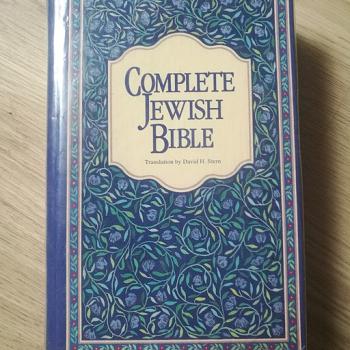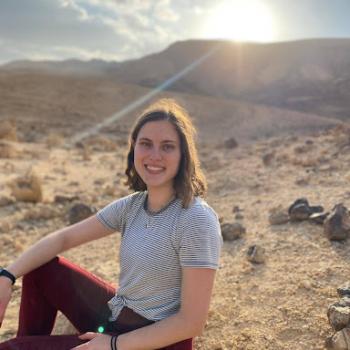Parashat Vayikra Leviticus 1:1-5:26
“Vayikra”: “And God called” (Lev 1:1).
This could have been a loud, dramatic word, announcing a series of divine decrees to open the book of Leviticus. But Parshat Vayikra begins with an unusual calligraphic detail: the final aleph of the first word, ויקרא (Vayikra), is smaller than all the other letters. This oddity of script catches the eye; it asks the reader to stop, linger, and draw closer to the text. The word “call out” contracts itself by curling inward. It is as if we have to listen extra carefully to a quiet voice calling from far away.
Many Torah commentators understand this unusual aleph to be a sign of unique intimacy between God and Moshe. According to Rashi, this verse teaches us that, every time God spoke (דבר or אמר or צו) to Moshe, God first called (קרא) to Moshe as an affectionate salutation, the way that the angels call to each other before proclaiming God’s holiness in Isaiah 6:3. To the other prophets of the world, God’s communication is described with a similar verbal root that lacks the aleph: “and God happened to meet (ויקר) Balaam” (Numbers 23:4). Rashi points out that this verb, from the root קרה, suggests a casual occurrence, chance, or uncleanness. Only to Moshe does God speak with the love and intentionality connoted by קרא.
But if the aleph is a sign of love, why write it small?
Two additional commentators offer different explanations. To each of them, there is something fraught about the exceptionality of God’s relationship with Moshe. On the one hand, uplifting this relationship might seem to imply exclusivity or hierarchy. On the other hand, God’s relationship with Moshe isn’t a relationship of exclusivity. God not only speaks to other prophets; God also gives and receives love to other people through communication that extends far beyond speech acts.
According to the Mei HaShiloach, Moshe is listening to God in this moment with a vulnerable heart. He is about to receive all the instructions for how his brother Aharon, the high priest, will enter into a special relationship with God through the offering of sacrifices and the tending of holy space. As God elaborates the details of this other loving relationship, God wants to reassure Moshe that Moshe, too, has a unique and privileged role to play. God promises that God’s words are for Moshe’s ears alone—hence the small aleph, the quiet call heard only by one person.
The Kitzur Ba’al HaTurim, in contrast, says that Moshe wants to write ויקר (“and it happened”) in the Torah’s telling of this encounter, as though God speaks to him the way God speaks to all other prophets. God insists on ויקרא (“and God called”), which conveys God’s love. Moshe accedes, but he writes the aleph small.
Does the smallness of the aleph emphasize or deemphasize God’s singling out of Moshe? Is it a sign of humility, or pride? The tenderness of jealousy, or the calm confidence of someone secure in being deeply and uniquely, but not exclusively, loved?
Perhaps the aleph signals all the complex valences of words shared in intimate relationships. It also tells us something else about the transformative connection between words and love: Moshe, in receiving and recording God’s affection, exerts his own editorial creativity.
Even as the small aleph suggests a uniquely intimate quality of communication between God and Moshe, the letter also draws our attention to its own quality as written language. We notice the way the letter was written and think about the scribe who wrote it.
This unusual letter at once teaches us that God speaks to Moshe in a way God speaks to nobody else—and also emphasizes the nature of Torah as a communal text, written down by human hands in a human alphabet, read out loud by human voices.
“ויקרא” is usually translated as “and [God] called out,” but it could just as well be translated as “and [God] read out.” What if we understood the beginning of the book of Leviticus as follows: “And God read to Moshe: ‘And God spoke to Moshe from the Tent of Meeting, saying…’”?
In this version of the story, God reads the text of the Torah to Moshe from the Ohel Moed, a place where Moshe cannot enter (Exodus 40:35). The small aleph might call our attention to the distance between God’s reading and Moshe’s hearing, the dynamic space between word and meaning.
Far from teaching us that Torah lives in a closed system of private communication between God and Moshe, the small aleph teaches us precisely the opposite—it contracts itself in order to create more open space. This is the kind of love it communicates: not love that is overdetermined, exclusive, or hierarchical. Rather, love that is dynamic and open, that is particular to those who share it at the same time that it nurtures other loves and relationships, that flourishes in the playful space of storytelling and communal meaning-making.
Even as Moshe receives the divine truth of Torah in God’s own voice, that truth has already passed out of Moshe’s hands; in the moment that Moshe writes down the Torah, Moshe-as-author dies. The Torah, as a text, belongs to its readers. We have the power to interpret, play with, multiply, and reshape its meanings.
God calls to Moshe—or perhaps reads to Moshe—and Moshe writes to us—and we read back to God, with careful and affectionate attention, our sacred human-written texts. Like Moshe, we can insist on telling the story in search of love that opens, proliferates, and expands.
Chaim Spaulding (they/them) is a Shana Gimel rabbinical student at Hebrew College. They love liturgy and Talmud, and they are passionate about helping people access rigorous Jewish learning, creativity and playfulness, difficult conversations, and grief. Outside of school, they like to write, hike, dance, sing, nurture local and long-distance friendships, and curl up with tea and a good book.
















